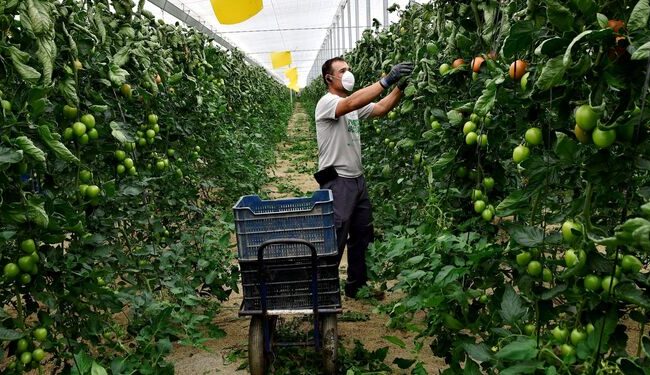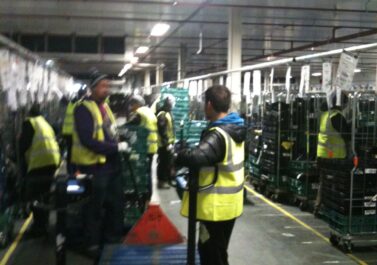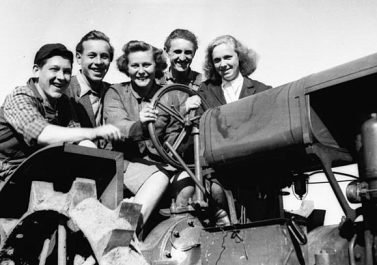We worked in a fruit farm in Kent picking strawberries. It was about 80 acres. The family who ran the business had several other farms. On our farm the strawberries were grown outside in poly-tunnels, suspended at chest height. The work we did was de-leafing (so maintaining the plants), and some picking work. We arrived in June and worked until September.
We lived in on a 1 or 2 acre caravan site next to a small industrial estate. Around us were fields with the polytunnels. The rent cost about £69 quid per week. So about a day’s pay. This included a bed in the caravan for up to 6 people, and it covered electricity, water, communal showers/toilets and cooking facilities. The pay was directly taken from our pay cheques.
The caravans were very basic. We saw pictures of other farms and they can be a lot nicer. The cooking facilities were also very functional. The toilets were always blocked. We arrived as a couple so were able to share the main bedroom. It had a mattress and a wardrobe. We got lucky, because this was better than other rooms. You could be in a very small room together with another stranger, sleeping a few inches away from their face. And one plug socket per room.
Between workers coming and going, there was no cleaning of the caravans. This was left up to the workers. Because it was the lockdown period, people left often as work reopened, e.g. the local McDonalds. When a new person came, the site manager would knock on your door and then it was up to you to introduce them to the caravan site and show them around. The new worker’s bed could still have the old worker’s stuff on it. So no, not much cleaning.
Up until mid summer we got up around 4.15/4,30am. Though it could be as early as 3.30am. We’d start work 45 mins later. We’d quickly eat something, get dressed and take our phones so that we could listen to music etc while working. You’d take a packed lunch with you.
We’d meet our team supervisor in the yard and then walk to the field we were working in and be given our task for the day. We had two 15 min breaks for the day. One around 9.30am and then one around 13.30. We’d finish around 2.30-3pm, though this could go later in August depending on the latest Supermarket orders.. So it could be a 10-12 hour day. Because it was summer, you had to also make sure you kept drinking water. You were told to bring your own from the caravan as water wasn’t supplied. If you needed the toilet out in the field there were some porta-loos, which were in an unspeakable state. Shit across the walls etc. Not great during a pandemic. There was no sanitiser. Sometimes there was no soap by the water pump outside, or no water pump at all.
When we were de-leafing we had to work our way down the 20-30m poly tunnel, one row after another, pruning the plants of their leaves. Up and down all day. There was always a target, which was far too high to achieve. We learned quickly that the way they tell you to do the de-leafing isn’t actually how people do it. You had to find ways to cut corners and to make it look like you’ve done it how they want it, but actually do it differently. More experienced workers would give tips on how to do this. e.g. spreading leaves on the floor in a way that made it looks like you had pruned more than you really had.
We only did de-leafing and picking, then others on our sites would place the fruit in trays that were then driven to the packhouse on the other side of the village at a different site.
The work was hard on the body – on your hands and legs, and dehydration was a real issue during the summer. It was hot under the poly tunnels and you had to bring all the water with you for the day from the campsite. You’d need at least 2L a day. But there weren’t any serious injuries while we were there. Once a week the farm organised a minivan to go to the local supermarkets so people could stock up on food and drink.
August was the busiest. There were around 200 at our caravan site, but they were also bringing people from another site, so there could be maybe 400 working on the site at that time. The main waves of arrival were late May/early June. Picking was at its peak in August, and after that people started going back to their countries, there was less work, and it changed to things like ripping up the plants.
There was one English guy we worked with who could speak Italian, and so he was able to communicate with a Romanian who spoke Italian, having worked in Italy for years. This Romanian showed the English guy how to pick the strawberries really fast using a technique with your hands. The managers don’t teach you this, or anything, so you have to learn from others. The work was measured in rows of plants, and we’d be given different quotas to do.
The supervisors were mainly Romanian and Bulgarian, but we had an English supervisor. He’d never done fruit picking before but he’d been a manager in a shop so they made him a supervisor. He’d work out the quotas (around 20kg of fruit per hour). The base pay was minimum wage, but if you went past a certain amount you’d be in ‘bonus territory.’ But you had to go really damn quick to even reach minimum wage territory. If you didn’t go fast enough too often, you’d get sent home to your caravan for the day. You’d get paid for your shift but then you wouldn’t get asked to work again. You’d just continue being on site with no work. You didn’t find out until the night before if you were rota’d to work the next day. This was put up on the kitchen notice board. The farm operated 7 days a week and you had to check the rota each night. So if you wanted time off you’d have to tell them you were having a day off or just not go to work and deal with it. Normally they were okay if you told them in advance.
There were mainly workers from Romania, Bulgaria and Ukraine, with some Polish, Slovakian and Czech. There may also have been some Roma workers on the farm. The Ukrainian workers lived on a separate caravan site and were shipped in to bulk up numbers when demand was high. The camp site we were in was mainly Romanian, and there was a second one that was mainly Bulgarian. People mainly stuck to their language group. The workers were mainly male, many in their mid-20s, but there were still plenty in their 30s, 40s, 50s. Some of the migrant workers seemed quite experienced, and many of the new ones had come with experienced ones who showed them the ropes.
Our work team was mainly English. At the start of June there were 35 of us, but it went down to around 16 who stuck it out a while and when we left at the end of September there were 4. The English workers didn’t last long. Many people were from hippyish backgrounds – normally working at festivals. Some had just been made redundant, and others had been travelling around the world when the pandemic hit. There were also a couple of dodgy people who seemed to just be there for cheap accommodation and to steal. Stressful when they’re living in your caravan. They didn’t stay long and moved on.
The English levels of the workers varied a lot. There wasn’t a whole lot of interaction between us and the migrant workers. We were the weird newcomers. The job was never normally done by English workers. We were only there because of the pandemic. It’s just not a job that’s normally advertised or accessible to English people. The culture is Eastern European and it’s its own world. Entering the farm is like going to another country. Romanian lads showing off their tinted cars, Eastern European BBQs and drinking. The social occasions were quite nice, but there was a lot of macho posturing as well – particularly from the Romanians, which was perhaps a response to the fact that all the nationalities seemed to look down upon them as the lowest.
Sometimes I overheard arguments or conversations about arguments, and often I couldn’t understand what was being said as it was all in Romanian, Bulgarian or Slovakian. But what I gathered from asking people what was being said, or from watching/context, was that people resented the target system and the speed they were obliged to work at. I regret how little of the domestic dramas which unfolded in the kitchen, ladies toilets, washing-machine room and at the picnic benches in between the static caravans I actually understood.
Why did we get a job working in a field? Working outside is always a bonus and we needed a place where we could live and work at the same time. We also had a slightly naive idea of what agricultural work would be like. Growing things seemed like a nice idea, but it quickly became clear that the reality of mass scale agriculture is very different. It’s just a factory in a field. This was pretty much the same realisation everyone went through there. Most people hadn’t experienced agricultural work and were pretty disappointed by the working and living conditions. You realise that the reality of work for low skilled migrants is extremely different to your average work environment in England. The norms, care, effort, health and safety you might expect in normal work environments doesn’t exist in poor migrant working situations here. Modern day slavery comes to mind – the farm we were on got done for slavery a few years ago due to not paying people who weren’t hitting targets and for people living and working in unsanitary conditions.
When we as the English workers arrived, the farm had to up their standards a bit because they knew we were used to other conditions and knew more about the law and what’s right and wrong. If you’re Ukrainian or Romanian you won’t know what the rules are here as much. Plus you’re here to work so you’re kind of stuck.
Despite our working from June to September 2020, no-one on our farm became ill with Covid. I did hear of other farms in other parts of the UK where one person became ill with Covid, shortly followed by everyone else on the farm and then the farm had to close. The living and cooking/washing facilities at the farm where I worked and at farms like it generally were such that if one person got Covid, everyone else would have, for sure. In the fields (90 acres) it was possible to work in a really safe socially distant way, but this didn’t really matter if we were then fifteen people in the kitchen at the same time and five to a static caravan. My theory as to why no one on our farm got sick with Covid is that in the summer infection rates were lower anyway, plus vitamin D is meant to be really effective at reducing risk of getting the virus and we were outside working from before midsummer sunrise until 2/3pm six days in seven. Luck also.
To begin with, pretences were made at keeping us in ‘bubbles’ and staying two metres apart, but this quickly dropped and everyone (our farm- roughly 100/150 people) more or less interacted as normal, before the pandemic. Our temperatures were taken once a week to check for fever but really that was all.
Also, I remember working in the field once with a Ukrainian team, and someone had got something stuck in their throat- a small hair from the strawberry plants perhaps, this happened quite often. This person was coughing and coughing trying to clear their throat and someone else in the next strawberry row said ‘Aha, coronavirus!’ and everyone in the surrounding rows laughed. That summarises how people seemed to relate to the virus, I think, in the context of their working lives. It was so serious it was hard to take it seriously any more, if that makes sense.
I don’t remember the UK folks who I mainly worked with and hung around with speaking about Covid that much. I think for many of us it was a real freeing joy to be working all together after the first lockdown in the late spring and early summer of 2020, and we talked about our lives, where we lived/were from and how Covid had disrupted our life-plans, but not really Covid itself. It was fun to just pick in the field all day together and then hang out in each others’ static caravans and get fucked up around a fire in the forest below the farm after dark. It was a good escape not to talk about the virus and I think we subconsciously avoided it as a topic.
As fruit pickers/agricultural labourers we were definitely key workers, but in working on the farm I came to be aware of a kind of stratification of key workers in public conception, with doctors/nurses at the top and people doing our work much lower down. I guess doctors and nurses are clearly linked to fighting the virus in peoples’ minds, but folks sweating away in an anonymous field deep in Kent less so. If anyone found a shop in Canterbury (the nearest large town) which offered discount for key workers we’d all tell each other to be sure to take the most advantage of it as a kind of practical solidarity thing.
I think workers at my workplace came out of this period stronger, as individuals and as a group. We learnt how hard we are able to work, which is not to glorify hard work for its own sake, but instead to celebrate our adaptability and ability to meet the challenge of survival in such a physically tough workplace. We grew together as a community of disparate people thrown together by a combination of economic circumstance and the environment created by the pandemic. Many times I realised that the main reason I was able to keep at the long, hot, itchy, dry, early, dirty shifts was the other people I worked with, and knowing that that ‘family’ would be there with me.



